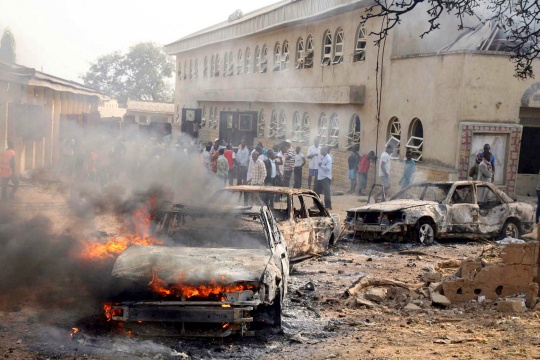At least three bomb explosions killed eight people at a military checkpoint in the northeast Nigerian town of Biu on Tuesday, witnesses and a hospital source said.
The military fired back on the attackers and killed 17 insurgents, a security source told Reuters.
Witness Auwalu Ibrahim, a local pro-government vigilante, said there were children around the checkpoint when the blasts went off. "Everyone has been told to go home due to apprehension about the blasts," he said.
Biu has been repeatedly attacked by the Islamist militant group Boko Haram and the use of multiple bombs planned to go off in quick succession is a trademark tactic of the jihadist.
A nurse at Biu general hospital said eight bodies had been brought in from the blast. Six people were receiving treatment for wounds, she said. The military did not respond to a request for comment. Boko Haram rarely claims responsibility for attacks.
In a separate attack bearing the hallmarks of the militant group, a suicide bomber blew himself up in a restaurant in the northeast Nigerian town of Potiskum on Tuesday, killing two people and wounding 12, a hospital source said.
Boko Haram's relentless attacks on military and civilians have killed thousands since the group launched its violent campaign for a breakaway Islamic state in mid-2009.
It has become the main threat to the stability of Nigeria, Africa's biggest economy and leading oil producer, as well as a major threat to the surrounding region. Neighbours Niger, Chad and Cameroon are all engaged in fighting the rebels.
Tens of thousands of people marched through Niger's capital Niamey on Tuesday to support their military following a series of Boko Haram attacks along the Nigeria border.
Nigerian soldiers recaptured two towns on Monday as U.S. and regional troops began war games in neighbouring Chad in a growing international campaign.
Involvement by Nigeria's neighbours, especially battle-hardened Chadians, has tipped the balance against Boko Haram fighters that the Nigerian military had struggled to contain.
Boko Haram was cited as a reason for postponing by six weeks a Nigerian presidential election that had been due to take place on Saturday. The election campaign has seen violence in other parts of Nigeria, unrelated to the Boko Haram insurgency.
Five explosions and a burst of gunfire hit an opposition rally in the town of Okrika in southern Nigeria's oil producing Rivers state on Tuesday, wounding several people, witnesses and the governor of the state said.
Violence in the northeast has hurt the re-election prospects of President Goodluck Jonathan, accused of doing too little to protect civilians from the militants. He and his team deny he has failed to tackle the insurgency.
In a sign of growing regional solidarity in the face of Boko Haram, presidents from the 10-nation Economic Community of Central African States (CEEAC) pledged on Monday to create an emergency fund of 50 billion CFA francs ($87 million).
/149

